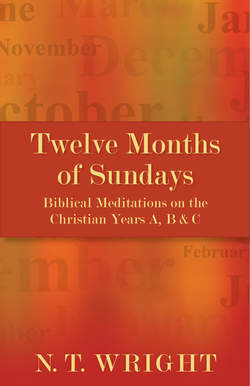Читать книгу Twelve Months of Sundays - N.T. Wright - Страница 15
На сайте Литреса книга снята с продажи.
ОглавлениеThe Second Sunday of Christmas
Jeremiah 31.7–14
Ephesians 1.3–14
John 1.1–18
C. S. Lewis said that it sometimes seemed an anticlimax to move from the broad poetic sweep of the Old Testament to the narrow focus and seemingly mundane concern of the New. No chance of that this week; but the readings show well enough why the problem occurs.
Early Christian writers were faced with a towering challenge. They believed that the events concerning Jesus were the fulfilment, the filling-full-ment, of the long and winding story of Israel. The hopes and fears, the laughter and tears, of all the years of Israel’s story, and the world’s story, met together in Jesus in Bethlehem, Galilee, Jerusalem, Calvary, the empty tomb. How can you write that into story after story? How can you say, and get your readers to take it in, that this birth, this death, this new life, were the reality towards which the prophetic signposts all pointed?
One obvious answer is more poetry; and that, in a sense, is what both Paul and John offer here. The Ephesians passage is a sweeping retelling of Israel’s story: God’s choice of his people, the redemption from Egypt, the unveiling of God’s wider purpose, the revealing of his will, and the personal presence of God as his people journey to the land of promise. Only it has all happened fully and finally – in Jesus the Messiah. Try reading the passage with the emphasis on ‘him’ each time, to bring out the surprise: it is in him that all this has happened, not in some other Jewish moment or movement, not in the rule of Caesar or any other feature of world history. The story is familiar, the hero unexpected. Open your ears, says Paul, and hear how the songs of the prophets have at last come round into the major key. Learn to listen for the echoes. Watch the picture come up in three dimensions, or maybe even more.
John 1 suffers from carol-service repetition. It becomes audible wallpaper: the headmaster’s drone tells the school only that it’s nearly time for mince pies. Almost worse: it is usually cut off at v. 14, producing the literary and theological equivalent of leaving the spire off a cathedral.
Try taking one image and seeing the whole Johannine poem reflected in it. In the beginning … You are standing in the dark looking eastwards out to sea. The stars flicker overhead. The first signs of light, and of life: grey pre-dawn sky, seabirds around the breaking waves. Grey turns to green, then gold. Curtains still closed inshore, oblivious to the wakening glory. Stars fade, sea and sky catch fire, and the bright, overpowering disk emerges. Too radiant to look at, but in its light you can see everything else. The heavens declare God’s glory, new every morning: was Psalm 19, along with Genesis 1 and Exodus 32—34, among the many passages in John’s mind?
New Year resolution: read the New Testament while the Old is still echoing around the mind’s rafters.
